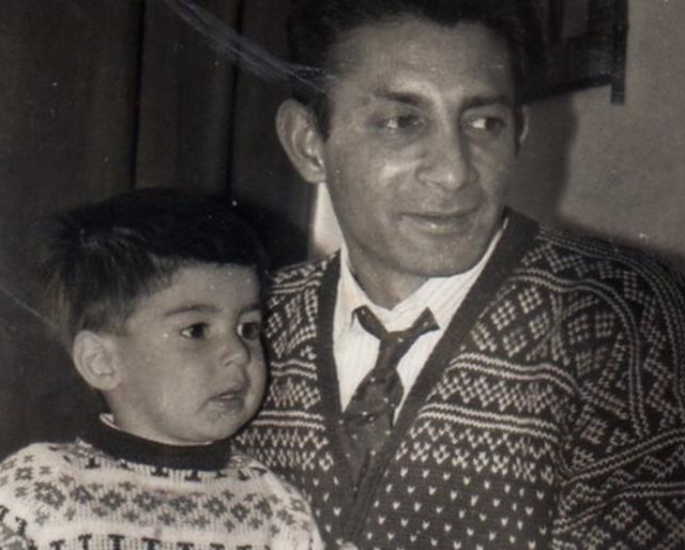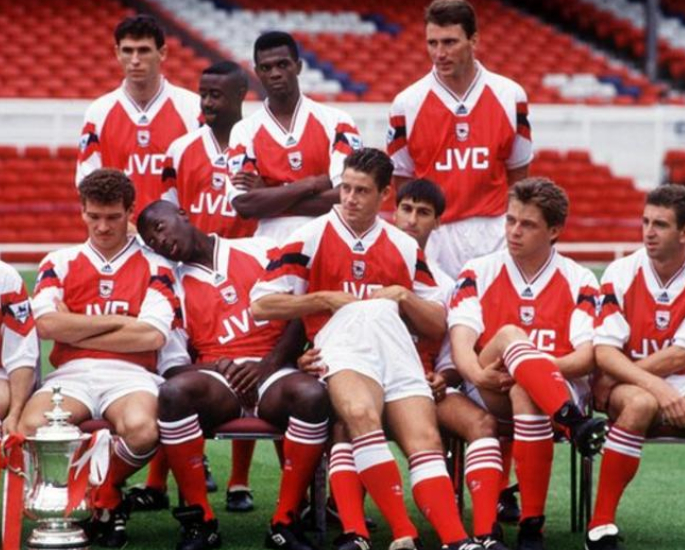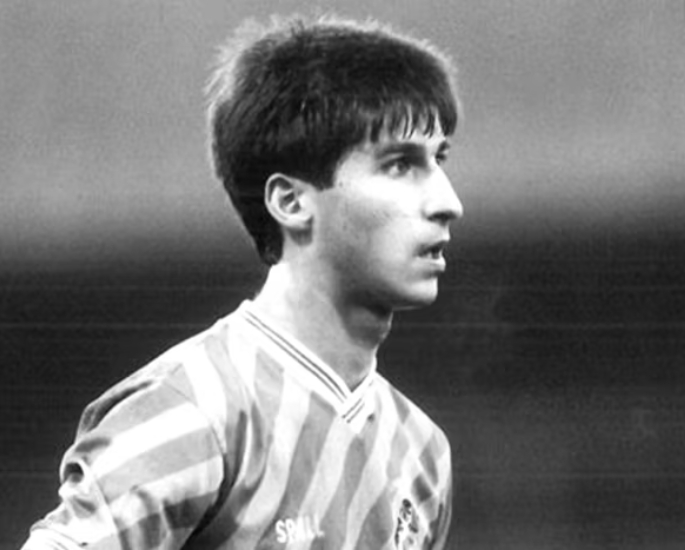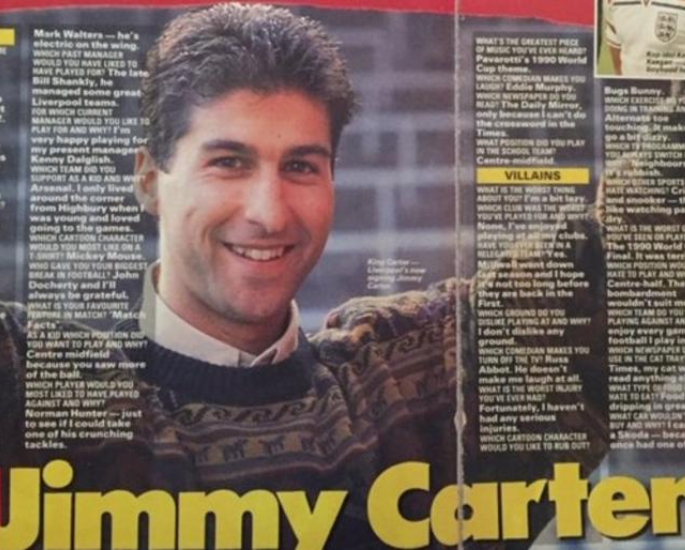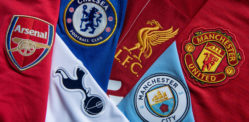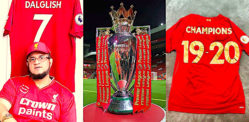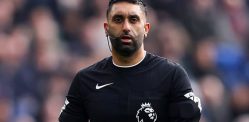"Hardly any of my teammates knew of my Asian heritage"
There exists a figure whose story resonates far beyond the boundaries of the beautiful game – James ‘Jimmy’ Carter.
He is not just a footballer; he is a trailblazer, an emblem of change, and the vanguard of diversity in the sport.
In the late 20th century, when the Premier League was still in its infancy and multiculturalism was beginning to thrive, Jimmy Carter emerged as a symbol of hope and inspiration.
His journey from the grassroots to the grandeur of the Premier League brought with it not only goals and victories but also a powerful message of inclusivity.
Diving into his early years, the challenges he faced, and the remarkable moments that defined his legacy, we explore how the footballer broke down stereotypes.
Likewise, we will compare his journey to modern British Asian footballers to see if South Asian representation has changed within the sport.
The Early Years
Born on November 9, 1965, in London, Jimmy Carter entered the world as the child of an English mother and Indian father.
His dad, Maurice, hailed from Kanpur, India but was brought up in Lucknow.
Maurice joined the Merchant Navy which forced him to move to the UK where he met Jimmy’s mother. Having divorced shortly after, Jimmy and his brother were raised by a single parent.
Discussing his early home life, Jimmy revealed how it was like any normal Asian family, telling the BBC in 2021:
“Our mum was English but whenever my dad could afford meat we’d have curry and rice.
“When he couldn’t afford meat, he’d drop a few boiled eggs in the sauce of the daal and we’d have it with rice.
“That’s how we were brought up.”
Speaking about his father and childhood, Jimmy told ITV:
“It was quite tough at times, but what he did instill in us was a huge work ethic and he encouraged us to play football and sport on a regular basis.
“He was always drumming home about being first and nobody remembers second place.”
“In terms of harshness, I’ll give you an example.
“Five o’clock in the morning during the winter, he’d pull the duvet off me and say go run around the local park twice, it’s pitch dark frost everywhere, snowing.
“I’d think ‘Come on Dad, why?’
“He’d say, your district teammates are tucked up in bed now and if you go out now, you’ll get one over them.
“He was always like that, you have to do more, you have to keep doing more.
“From my perspective, I just wanted to make him proud.”
Like many British Asians, football and cricket are the main two sports that they take part in.
However, parents rarely push their children to go that extra step further within football due to the lack of diversity in the sport (something still apparent today).
But, it was different for Jimmy. His career started off young at just 14 years old, playing for the London club Crystal Palace.
Five years later, he moved to Queens Park Rangers and was then bought by Millwall in 1987.
He made his Football League debut in a draw against Oldham in the same year.
Despite spending four years at the club, Jimmy Carter found it difficult to get amongst the goals.
However, as a winger, his main job was to assist his strikers and of course, chip in with some goals.
This Millwall squad featured the likes of Teddy Sheringham (ENG), Tony Cascarino (RI), and Terry Hurlock (ENG) before they achieved widespread recognition and fame.
Jimmy finished his first season with 12 appearances and one goal.
The 87/88 season was Jimmy’s first full season with Millwall. The gaffer had faith in the midfielder, as he made 31 appearances but didn’t net once.
The subsequent season was Jimmy’s best goalscoring season for Milwall, getting six goals in 23 appearances.
By the end of his journey at Milwall in 1991, he made 129 appearances and got 12 goals.
Whilst these are disappointing stats, compared to the numbers other players were getting, there was still a buzz around the pacey winger.
After all, he was a member of the Lions’ team (Millwall) that secured promotion to the top division, marking a historic achievement for the south-east London club in 1988.
His tenacity and passion for the ball spoke volumes and eventually caught the attention of Liverpool FC.
A Big Breakthrough
In January 1991, Sir Kenny Dalglish, the Liverpool legend signed Jimmy Carter for £800,000 – a record transfer fee back then.
However, Dalglish left the club shortly after and Ronnie Moran took temporary charge before another Liverpool icon, Graeme Souness, took over.
Speaking on the deal, Jimmy revealed:
“I always wanted to pull on a shirt for Liverpool and I don’t know if I manifested it.
“For me to get the call from Sir Kenny Dalglish and for him to say, Jimmy, we want to sign you, hop on the train, I’m gonna meet you at Lime Street and you’ll be a Liverpool player tomorrow, it feels like yesterday.
“Getting off at Lime Street, meeting Kenny there in his Mercedes…I’m thinking to myself gosh – this is unbelievable!
“Back in the day, we used to come to Anfield get changed in the changing room, get on a rickety old bus, and go down to Melwood.
“So my first day walking into Anfield, I’m sitting next to Bruce Grobbelaar, Jan Mølby, Ian Rush, John Barnes, Ronnie Whelan – all these top players.
“I used to watch them on Match of the Day so all of a sudden I’m rocking up and it’s incredible.
“A small part of you knows you’ve done something right to be there.”
“Kenny said just be yourself, we’ve bought you to be on that wing and whip the crosses in, just do what you love doing.”
Jimmy made his debut on January 12, 1991, against Aston Villa – just two days after he signed for the club.
His second match was against Wimbledon in which The Guardian described his performance as a “Milwall player masquerading in a Liverpool shirt”.
Only six weeks after Jimmy made his transfer to Merseyside, he lost his place in the starting line-up.
It was clear that Souness didn’t rate the 25-year-old.
This was evident after Jimmy was substituted against Chelsea after coming on as a substitute earlier. He only made three appearances under the Scottish manager.
Perhaps things would have worked out differently for Jimmy if Dalglish had stayed in charge of Liverpool. Speaking on his abilities, Dalglish said
“Jimmy Carter had everything: good technique, he could dribble, get past people, whip in crosses.
“Jimmy could have been a tremendous asset. The mental side was his problem. Maybe Liverpool was too big for him.”
However, this lack of faith didn’t deter other top clubs from giving Jimmy another chance.
Only playing five league games for Liverpool, the massive club Arsenal, came in for the player and bought him for £500,000.
A Second Chance?
The Premier League was formerly known as ‘England’s First Division’ but was rebranded to its famous name in 1992.
Therefore, Jimmy Carter already made history as the first ever British Asian footballer to grace this new era of the sport.
However, this was the only major accolade Jimmy had to his name during his time at Arsenal.
Jimmy Carter was part of the Arsenal squad that won the FA Cup and Coca-Cola Cup in the 92/93 season. However, he never played in any of the finals.
Having made 25 league appearances for the Gunners, Jimmy only scored twice.
It was clear that managers were growing impatient with the midfielder, even though he had great skill.
As footballers, they want to play the game they love so equally, Jimmy was also frustrated he wasn’t getting any game time.
Therefore, he was loaned to Oxford United and then made a permanent move to Portsmouth in July 1995 who were in the league below.
The lower leagues tended to suit Jimmy more and looked more comfortable playing in the games.
Portsmouth recognised this and he made 80 appearances for the club, scoring five times across three seasons.
Seven years later, in 1998, Jimmy Carter made a remarkable homecoming to Millwall.
Career-Ending Injury
Having played 12 games upon his return to The Lions, Jimmy had to retire at the end of the 98/99 season.
Only aged 33, Jimmy was forced to end his career due to a significant back injury that wouldn’t allow him to play the game he had been his whole life.
Regardless of this, the winger still had a colourful career with different teams.
Although he found it harder to receive legendary status at clubs like Liverpool and Arsenal, it doesn’t take away from his personal accomplishments of being the first British Asian footballer to grace these clubs.
Reflecting on such an achievement, the former professional expressed:
“Being the first British Asian to play in the Premier League at the time…it’s only sort of come to light in the last few years.
“People say, ‘Oh did you know that you were the first British Asian to play in the Premier League?’
“It’s always nice to have that…it was such a proud, proud thing to achieve.”
At least Jimmy can say that he used to play for two of the biggest clubs in the world.
Challenges and Backlash
Even though Jimmy’s historic achievement in the Premier League is iconic, there were many that ridiculed him at the height of his career.
Jimmy took pride in being the Premier League’s inaugural footballer of British Asian heritage.
Nevertheless, he never disclosed his Indian ancestry to anyone, a choice driven by concerns related to racism.
Speaking to the Daily Mail, he explained:
“I’d get some racial abuse from the terraces for being dark but in the dressing room, they just thought I had been on too many sunbeds.
“Nobody ever said anything because I had an Anglicised name.”
Speaking to the BBC, Jimmy further revealed the difficulties of navigating the pitch right from the start of his career:
“Whenever I got abuse, I always wanted to prove the person who instigated that racism wrong.
“I wanted to humiliate him on the football field. That would be my answer back.
“I would never go back home and tell my dad. I knew how much that would hurt him.
“He would’ve thought that because of his skin colour, my skin colour is what it is and, because of that, I got racial abuse and there was nothing he could do about it.
“I took it on myself and became thick-skinned. It made me more determined.
“You have to show them that: ‘Yes, you called me that, but that Indian boy you just tried to kick has just humiliated you; you are going to be reading about me and watching me play for the biggest clubs in world football.’
“That’s how I spun it around.
“My second chance came at Millwall.
“Football was very different back then and I felt there was no real need to disclose my Indian heritage – it was just about playing.
“Hardly any of my teammates knew of my Asian heritage apart from Teddy.
“I always felt welcomed at Millwall but I’d sometimes get a few racial comments from the opposition just because I looked a bit different.
“Looking back, they were comments that you probably couldn’t get away with now, but I never took them to heart. For me, it just made me more determined.
“To get on in football, if you were to take offence or have any bitterness towards it and bite back, then I probably would have got a harder time.
“It’s not nice to hear, but it was a different era back then.”
“It was all about getting your head down and making sure you stayed in that first team to better your career.”
But, it wasn’t just the comments from fans that Jimmy suffered with. Even after his retirement, he has faced ridicule from outlets such as Bleacher Report.
In 2012, Rob Greissinger wrote the article “Jimmy Carter and the 7 Worst Reds of All Time”.
Within his opinion-based report, he said it was “easy” to pick on Jimmy Carter “because of his name”. He further outlined:
“When a footballer is named after a United States president, he’d better perform or be ridiculed for the rest of his life.”
On the lack of appearances at Liverpool, Rob said:
“When you only play five times for a team before being sold, you’re pretty bad.
“He may not be as bad as Sean Dundee or Jean Michel Ferri.
“But he stands out the most because of his name and when Graeme Souness subbed Carter for himself five minutes into a match, it was easy to say that he would be shown the exit door.
“He was sold for to Arsenal where he didn’t do much better.”
Whilst speaking solely on the performance accolades, Rob is correct in saying that Jimmy didn’t make much of an impact on the Merseyside crowd.
But to ignore his historic transfer, and to not even include it in his article, shows the dismissive nature of British Asian footballers in mainstream media.
Modern Day Representation
Have things changed since Jimmy Carter made his Premier League debut?
According to statistics, South Asian representation is very low in football, despite being the largest ethnic minority community in the UK.
Data from The Professional Footballers’ Association (PFA) suggests:
- 12.6% increase in elite football players identifying as South Asian heritage: 134 players in 22/23, up from 119 players in 21/22.
- 53% of South Asian professional players signed to Premier League and Championship clubs.
- 63% of Academies have at least one South Asian heritage player, up from 53% in 21/22.
- 1.45% of scholars are of South Asian heritage, marking a nearly 9% increase from the 21/22 season.
- South Asian players constitute 0.91% of players in the Foundation and Youth Development Phases, compared to 0.82% in 21/22.
- Six league debuts for South Asian heritage players occurred between 2022 and 2023, showing significant growth compared to two league debuts between 2018 and 2021.
- At the professional level, only 17 out of nearly 4,000 players are British South Asians, accounting for less than half of 1%.
Whilst there have been notable players across the years since Jimmy’s debut, no one has reached the fame and status of Ronaldo, Messi, Neymar, etc.
Talking about what change needs to happen within the sport, Jimmy Carter stated:
“I think probably what needs to happen is more of a top role model to really hit the big time.”
“That will give the younger generation the five and six-year-olds, if they saw a Ronaldo type player who was of Asian descent, if they saw a player of that stature, that gives them something to aim for.
“I think that will be really important but it’s good to see more British Asians are being encouraged.
“It’s going to take time, it doesn’t happen overnight, but there are a few Asian players playing at the moment in pro football and that’s good to see.”
Time will only tell if trailblazers like Jimmy will ever see a footballer of South Asian heritage hit the big stage.
As a commentator for Sky, property developer, and proud ambassador for the Millwall Community Trust, Jimmy can proudly say he made an impact on British Asian footballers.
His story is a narrative of resilience and perseverance.
Overcoming racial abuse, discrimination, and career setbacks, becoming the first British Asian player in the Premier League is a testament to his spirit.
His legacy continues to inspire not only those who share his heritage but all who believe in the principles of inclusivity and equal opportunity.
In celebrating Jimmy Carter’s groundbreaking journey, it is our duty to carry forward his legacy, ensuring that the path he forged remains open for generations to come.




















































